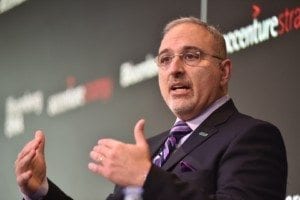
Many investors and senior business leaders are growing increasingly frustrated by the lack of disclosures associated with “quarterly capitalism”. The truth is, investors are looking at companies to provide disclosures around environmental, governance and social risks that would encourage rational long-term capital allocation. This was one of the many areas of focus at Bloomberg’s 2nd Annual Sustainable Business Summit this year. The company’s Founder and three-term Mayor of New York City, Michael R. Bloomberg, took the stage to discuss the value of sustainable business and how CEOs, investors, government officials and other key stakeholders can collectively contribute to long-term value creation that is good for society.
“The sustainability challenge is good for business,” said Bloomberg (pictured above) during his opening keynote at the Summit. “When investors are talking to money managers, they separately ask about performance—but before they do that—they want to know about what kind of investments they are making.” Bloomberg went on to explain the reasoning behind this. He said, “beneficiaries want their money invested in a socially responsible way so it’s good for business, it’s good for the planet and families.”
The two-day summit brought together a unique blend of thought leaders, financial-decision makers and global executives who were focused on one common agenda: driving sustainable business to create long-term value.

On the flip side, for investors who feel that spending on sustainable practices may require a financial sacrifice that won’t reap in quality rewards, a recent study by Morgan Stanley Institute for Sustainable Investing found that investing in sustainability has—in many cases— usually met, and often exceeded, the performance of comparable traditional investments. Audrey Choi, CEO, Institute for Sustainable Investing, Morgan Stanley, highlighted during her panel discussion that gender equity influences performance as well. “In a separate study by Morgan Stanley, we found that companies who do a good job on gender equity did better on long-term ROE and volatility and they moderately outperformed their peers,” Choi said.
Promoting Sustainable Business Through Culture & Transparency

Hewlett Packard Enterprise (HPE), known for its long history of innovation believes that culture drives value and progress. In the technology world, the emphasis has always been on creating the next product that will change the lives of customers, but for HPE getting there the right way and making the right decisions are equally important. “We believe in making a contribution that is sustainable and socially responsible, and this is in our values, which we call ‘Living Progress,’” said Executive Vice President Antonio Neri, HPE (pictured right). “One thing we strive for is to not only drive the best performance, but to do it responsibly.”
In September, HPE marked an important milestone in its Living Progress journey. The tech company joined RE100 with a commitment to reach 100 percent renewable energy, while setting an interim goal to source 50 percent of its total energy consumption from renewable energy sources by 2025. “We are confident that we will meet this goal because we have the engineering, culture and will to achieve it by 2025,” added Neri.
The trick is to set goals that cause people to innovate—but it’s a journey
—Mike Pedersen, President and Chief Executive Officer, TD Bank
The sustainability challenge, however, varies according to industry. For some, the growing number of global supply chains remain a complex task at hand—especially when it comes to transparency and traceability. Tiffany & Co., for example, realized early in its sustainability journey that maintaining control over its supply chain ensures that they invested in the most environmentally and socially responsible businesses around the globe. “Today we are the most vertically integrated jeweler,” said Anisa Kamadoli Costa, Chief Sustainability Officer, Tiffany & Co. “We craft a majority of our jewelry in Tiffany workshops around the world and invest in manufacturing–not only because it helps us maintain the integrity of our supply chains—but also because we are able to invest in local communities, create jobs and train artisans.”
In Kamadoli Costa’s current role, she’s charged with leading sustainability for a global brand and serving as Chairman and President of the Tiffany & Co. Foundation, which is a separate legal entity from the company that supports the business’s wider commitment to preservation through grant making efforts.
So rare to hear, "we don't have a 'green' line cuz it's part of all our products." So said @AnisaNYC from @TiffanyAndCo #SustainableBiz16
— Andrew Winston (@AndrewWinston) October 6, 2016
At Tiffany, responsible mining is very important to the company’s impact on the environment. Unlike other jewelers, Tiffany sources the majority of its rough diamonds and precious metals through direct supply arrangements with specific mines and from recycled sources. “For us transparency is key to ensuring that we are sourcing from responsibly-managed mines, and our approach to understanding the journey of a Tiffany diamond from the mine to the hand is something that is unique within our industry.” She added, “We are proud of the fact that we have such direct control over our supply chain.”
Schapiro Calls for More Regs Around Climate Change
Mary Schapiro, Former SEC Chairman and Vice Chair of the Advisory Board, Promontory Financial Group, took a closer look at the impact of climate change across the board. When it comes to regulations, Schapiro suggested that the SEC should do more as companies need to provide detailed and cohesive disclosures to decision-makers. “Investors want the information they need so they can make rational capital allocation, but they are not getting it. Instead, they are receiving boilerplates, silence or biased self-select disclosures,” she said during a panel discussion that focused on the work of the Task Force on Climate-Related Financial Disclosures, where Schapiro also serves as the Special Advisor to the Chair.
"We hope the TCFD is the single framework solution for preparers and users"-Mary Schapiro #SustainableBiz16
— TCFD (@FSB_TCFD) October 5, 2016
Follow the full conversation on Twitter under #SustainableBiz16



